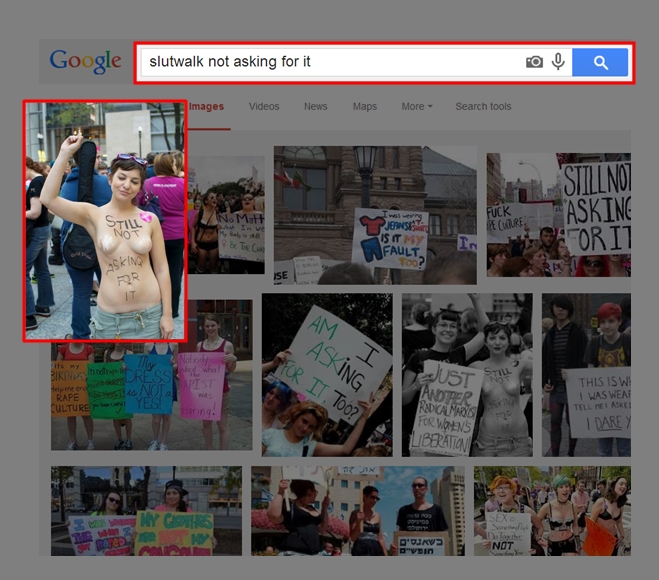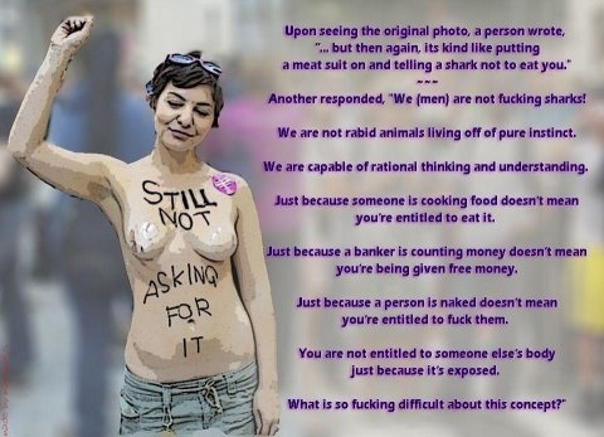Shortly before I took a blogging hiatus, I wrote a post on the rape singularity. To illustrate it, I wanted to find an image from one of the SlutWalk protests. It was meant to illustrate a strong counterpoint to victim blaming in a way that I thought might be a bit forceful to readers who haven’t heard much about this. You know, get people thinking a bit. So I Googled around a bit, and here’s a more reconstruction of the types of images I would have encountered, with the image I chose for the post highlighted.

It was a defiant picture and has also made it as a bit of a meme on the intertubes, as can be seen from this stylised version:

And that’s why I chose this image to illustrate a post about the latest coverage of rape in the media. Now, I’m not sure this was such a good image for the post — and the reasons why are important enough for a new post entirely!
Of course, I’m not begrudging this protester’s message and presentation (or anyone else’s). It’s a great message and nakedness can be a pretty good fuck-you way of saying it. If more people went and did the same thing, the world would be a much better place.
I’ve come to learn a few important things since this post, which can be accessed at the #solidarityisforwhitewomen hashtag on Twitter. I also learned of some criticisms of the nature of some past SlutWalks — namely, making it all about the experiences and concerns of the white participants (for the FIRST TIME EVER). The protester who wrote that message and went topless did so for many reasons. Her personality, opinions and views were crucial factors of course. However, other factors also contributed to making her expression possible. In the photo, we can see that she will probably be read as:
- white
- cis
- heterosexual
- able-bodied
- conventionally attractive
- probably in her 20s
- of “acceptable” body size
- middle class
- someone undergoing a tertiary education
- someone who may be angry about rape but whose anger is displayed within the acceptable bounds of civility and comes with the required dose of irony
(for more on “civil” disagreement, here’s a post I prepared earlier)
I don’t know if any of those things are true and some could well be false. The above list is only about our assumptions as viewers and not the protester herself.
As an exercise, try imagining what would have happened if these variables started to shift. Would she still have considered this protest as viable option? Would it have been so well-received by the intertubes (and gone viral)?
My guess is without some of these attributes, she might have felt a lot less comfortable and safe protesting topless. If her body was considered marginalised, it would likely not have gone viral. The sad reality is that there would probably be hundreds of comments about how she’s “too ugly to rape” (but also “needs to be raped”), about how she’s “not a woman” or an “it” and a million other such things. Finally, if she had written a typo or something that was more straightforwardly furious, the reaction would probably be quite different.
The photo would probably not have ended up as a positive and empowering example of sex-positivity. Which is why the Google Image Search screenshot above does NOT include any photos of women who don’t fit the above criteria. They were probably out there but their photos didn’t make it out here…
This shows the problem behind how such memes are spread. The protester in the image would probably be considered sexy by the general public. Now, the general public has a very narrow and prejudicial definition of sexy. (Not that any of us are exempt from this, dear reader.) Our minds largely work off stereotypes, whether we like it or not. If we promote mainly “sexy” images, the subtext is that this is the archetype of someone whose consent matters. Will this be a problem? If it’s someone who is nothing like this protester, will we be more likely to victim-blame, to harass, to withdraw support? (Yes.)
I think we need a much larger circle of compassion. To increase the circle, we should always remember who it is we are humanising when we create and spread messages. Only when consent and humanity are unconditional do they become truly real — as opposed to a favour we bestow on the “deserving”. We should grant it to everyone. This includes anyone we might personally find aesthetically “displeasing”. But to me it should stretch much further still — to people whose behaviour we might find repugnant. In light of this, here’s a shortlist of some people whose consent also matters, who also do not deserve to be raped or assaulted:
- someone who defrauds the elderly out of their life savings
- someone who beat a 90 year old woman to death
- someone who doesn’t respect the consent of others
- someone who makes rape threats on the internet
- someone who rapes other people
- the perpetrators of the absolutely horrendous gang-rape in India who were recently sentenced to death
- a child molester
- a child molester who is the head of a massive child-pornography ring
- someone who traffics people into slavery, including sexual slavery
- a mass murderer
- Hitler, Stalin, Mao and the fucking devil himself




0 Comments